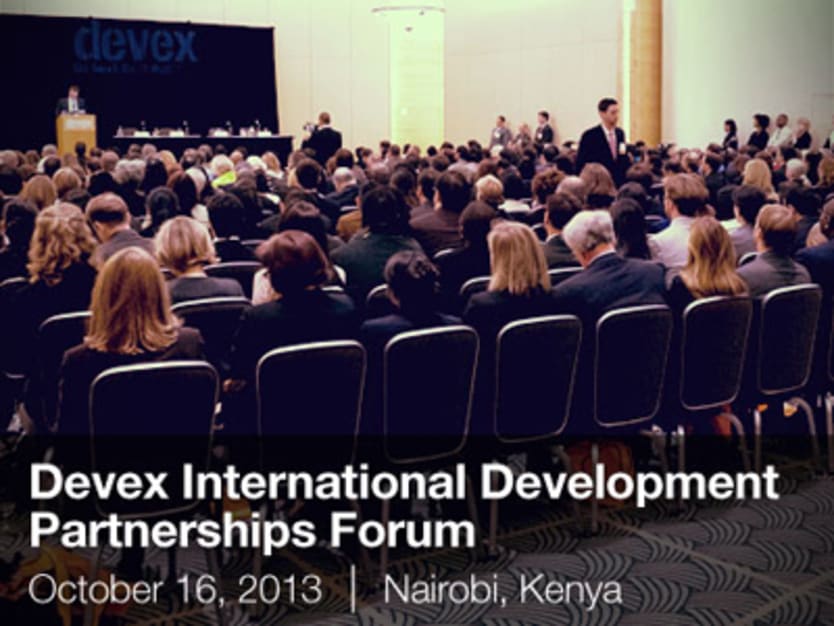
Procurement reform is a common theme among most of the top donor agencies. A key element of this reform is an increasing push to go local — moving funding and leadership to the local level where development really happens.
While aid agencies such as the U.K. Department for International Development, EuropeAid, U.S. Agency for International Development, Australian Agency for International Development and others are changing their policies, little has been done to create the practical conditions that would allow localization to take hold. These conditions include creating linkages between large development implementers and local companies, nongovernmental organizations and institutions that will take on greater leadership in the development of their own nations.
Devex is taking a modest first step toward addressing the practical challenges associated with localization by launching our first International Development Partnership Forum in Nairobi, Kenya, on Oct. 16.
The event will bring leaders of local East Africa-based organizations together with representatives from global development implementers to strengthen their networks and focus on the practical requirements of the movement towards the localization of development. The Partnership Forum will be followed by a career fair on Oct. 17 to connect hiring organizations with top local talent across the region.
We invite qualified local organizations across the East Africa region to apply to attend this first-of-its-kind event. Here are five practical ways local NGOs and private sector firms in attendance will benefit.
1. Localization and glocalization
International donors are steadily moving toward a model where projects are designed, planned and implemented by local government, local partners and local professionals, but these donors will expect local entities to perform to a global standard. A process of adaptation will play out on both sides of the equation: International groups will increasingly leverage local partners to improve project delivery and reach, but local organizations have an opportunity to heed global best practices and learn to apply them effectively to local contexts and conditions.
2. Speak the language
Like most other industries, international development has its own language laced with confusing acronyms. Some phrases, terms and acronyms are donor-specific, while others crosscut the industry. What’s an open procurement procedure versus a restricted procurement procedure versus a negotiated procurement procedure? Do the European Commission and DfID define those procedures the same way? Is my firm eligible to bid on that framework contract? Is the COP managing the M&E? At the same time, local organizations can effortlessly recite the names of important local ministries, officials, regions and rules which can take international groups years to grasp. The Devex Partnerships Forum presents an opportunity to share these languages.
3. Get to know your capacity building partners
While more donor funds will flow through local organizations, international donors and their partners will be called on to address structural impediments and build and sustain local capacity. In order for donors to succeed they must formally identify and assess local capacity gaps and provide training and resources to close those gaps. As localization evolves and takes hold, it will be more important than ever for local and international organizations to view one another as genuine partners, not competition.
4. With opportunity comes (compliance) responsibility
More funding opportunities are sure to open up, but international donors generally subscribe to strict bidding rules, financial management and reporting requirements to which local partners find it difficult to comply. Some donors are developing simplified procedures for local groups to bid on projects and secure funds while also working to improve local capacity in proposal writing, project monitoring, evaluation and reporting, and financial management. Local organizations will learn from leading donors and implementers on how to build this capability and win more funding.
5. Get better at business development
As donors go local, competition will stiffen. From basic networking, to developing well-written capability statements and past performance qualifications, to project forecasting, local organizations are smart to raise the sophistication of their business development strategies, tactics and tools. Building successful partnerships is also key to both international and local organizations remaining competitive in this changing landscape. The International Development Partnership Forum will provide a venue for creating these linkages and building strategic relationships essential to securing future funding.
More than 30 international organizations and firms are already registered as exhibiting organizations including sponsors RTI International, Catholic Relief Services, The British Council, Deloitte and MSH. If you are an implementing organization based in East Africa and would like to participate, please request an invitation here. Given the limited space, acceptance is by invitation only and we expect to reach capacity quickly.
As we lead up to the event, we will continue to cover the important topic of localization and the practical implications on donors, implementers and professionals working in the global development industry.
Read more about the trend of aid “going local” as well as the Devex Partnerships Forum & Career Fair in Nairobi.
See more:








